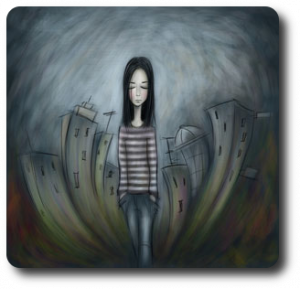 Sometimes, parents no longer experience themselves as being important for their children and don’t feel competent anymore to take care of them. This can cause a downward spiral, where the idea of a brighter family future seems remote. In this post, I will address how parents and their children can co-develop a fatalistic outlook on the future. Using a case example, I will try to illustrate how professionals can support parents to separate their own outlook from that of their children once again.
Sometimes, parents no longer experience themselves as being important for their children and don’t feel competent anymore to take care of them. This can cause a downward spiral, where the idea of a brighter family future seems remote. In this post, I will address how parents and their children can co-develop a fatalistic outlook on the future. Using a case example, I will try to illustrate how professionals can support parents to separate their own outlook from that of their children once again.
Seemingly small stories of parenting can be very helpful in such processes. Through anecdotes and memories, parents can reconnect with what they find meaningful in the lives of their children and what they find important to contribute to their children’s development.
This way, parents can revision the constructive influence they have, even when it is unappreciated or does not get noticed. Memories of parenting offer reflection and dialogue on different possibilities in parent-child communication, and holding on to these can offer strength in times of unbearable hardship .
I work in a group practice for child psychiatry and family therapy in Belgium. Here, I am confronted with families where children and adolescents, due to anxiety or depression, tend to completely detach from important aspects of life, such as school or social interaction. When we as professionals agree with families not to switch to residential treatment just yet, we look for a multidisciplinary way of working that offers support in such a strenuous period.
What the outside world seldom understands, is the distress that parents experience when they carry the heavy burden of children struggling. Parents really try to keep their children engaged in daily life, but behind closed doors these expectations sometimes are met with extreme emotions and extreme behaviour.
In therapy, parents talk about the heart-rending pleas from their children to “leave them alone!” or to even “let them die”. In  more than one case, children threaten to inflict injury upon themselves or kill themselves, and act acting violently towards family members. This increases the pressure on parents tremendously. In parallel to avoiding school, socialising and family life, a significant number of these children increasingly refuse to engage in therapy or take any part in the professional care that is offered.
more than one case, children threaten to inflict injury upon themselves or kill themselves, and act acting violently towards family members. This increases the pressure on parents tremendously. In parallel to avoiding school, socialising and family life, a significant number of these children increasingly refuse to engage in therapy or take any part in the professional care that is offered.
Parents gradually get caught up in anxiety and stress that is very similar to that which previously got a stranglehold of their children, and begin to expect less and less from them. They become convinced that all of their expectations are damaging for the well-being of the child and are strongly influenced by the feedback of their children that they are ‘horrible people
It becomes very difficult to find a way forward, when neither parents nor professionals succeed to engage in conversations with these children. Residential child psychiatric treatment may seem inevitable in such a situation. And of course, that can sometimes be a logical and useful step to take.
At the same time however, experience shows that in some cases residential treatment can be postponed or even averted when the adults who are involved succeed in pulling each other out of this ‘swamp of inability’. It is an interesting hypothesis that children or adolescents who find it impossible to envision a future where they are less besieged by stress and anxiety, who feel incapable of leading a normal life, will benefit from the significant adults in their lives becoming able to hold on to, imagine and reflect such a constructive future as long as they cannot.
In the midst of everything that influences them, we can assume that these young people are likely to be sensitive to feedback that people believe in them, that the world is a place to be lived in, that it is very well possible that things will be better in time. Of course, this a complex proces that has to be embedded in a strong theoretical framework and an array of methodical interventions.
And yet, it is my experience that initiating this process of positioning as parents and re-differentiation from the perspective of the child, can become tangible and comprehensible through conversations about small but relevant interactions with their children, now and earlier on in their family history. The process is one of creating stories about themselves as parents bearing and containing the uncertainties of their children on the one hand and, on the other, embodying a livable future. I will show a fragment of such an exploration.
I am working with a single dad of two teenagers: a seventeen year old boy and a fifteen year old girl. His daughter is struggling with depression and has a lot of social anxiety. For four months now, she has been refusing to go to school or to engage in any professional care. At home, she lives isolated from her father and brother. She says “it’s all too much for me”, and alternately reacts with great grief or serious aggression whenever her dad asks her when she will be going to school again. Sometimes she cuts herself and threatens to do so more often if her dad makes her do ‘stuff she can’t do anymore’.
professional care. At home, she lives isolated from her father and brother. She says “it’s all too much for me”, and alternately reacts with great grief or serious aggression whenever her dad asks her when she will be going to school again. Sometimes she cuts herself and threatens to do so more often if her dad makes her do ‘stuff she can’t do anymore’.
Dad: “My daughter Louise is really losing it! She refuses to discuss just about anything. She refuses to talk to me or to anybody else. She says that everything makes her tired and anxious. She says that she’ll wait until next year to start things over. But just a week ago, she also mentioned that she is going to throw herself under a train because all the girls in school are bitches. She says I am a terrible dad who wants to destroy his own kid! …Lately I’m just afraid to ask her anything, really. She immediately just explodes or throws herself unto the bed, screaming face down into a pillow.”
Therapist: “I wonder, Eric…maybe it’s a bit of an odd question, but how do you think Louise thinks about how you look at her?
Dad: “Well, I do think she senses that I think she’s lost it, you know…. Lately, I don’t really talk to her at all.”
Therapist: “Do you think she has any perception about you having any hope?”
Dad: “No, I don’t think so…I got to tell you, it is so hard to be hopeful and think ‘come on, we’ve got to get through this’…. She is convinced that she is crazy. Deranged!”
Therapist: “Do you think that she thinks you consider her to be deranged?”
Dad: “Hard to say….More and more, I do think that the ship has sunk.”
Therapist: “Tell, me, Eric… Do you have any memories of situations where your children had to rely on the trust you had in them as a father?
Dad: “What do yo mean?”
Therapist: “Well, as an example I am just thinking about the croup attacks that my daughter sometimes gets. Are you familiar with croup?
Dad: “Croup, is that the one with the horrible cough?
Therapist: “Yeah, that’s it. Croup is a respitory infection that mostly young kids can get. It can come up quite suddenly. Kids have this weird ‘barking cough’ that is accompanied by a harsh grating noise. It can go on for quite some time and can cause small or severe panic attacks. And the thing is, the more children cry and scream, the more the mucous membranes swell up, increasing the grating noise and thus the panic. When my daughter has croup, she completely loses it. That strange cough and the tightness in her throat really frighten her. A croup attack mostly comes up in the middle of the night. One of the things that helps is when you take your child to the bathroom and run some water. The steam relaxes the trachea a bit. It’s hard for me to stay calm. And yet I know that this is important for her. You see, my panic increases hers, so I have to try and separate her experience from mine and I try to keep it that way. I know her panic is real for her and that she is struggling with it, but I also know it will pass. I try to support her, but I also try and stay calm. I know that if I go into ‘panic mode’ as well, we’ll both end up in a situation that feels like there’s no way out. It’s hard to do, and I am not always as good at it as I would like to be, because these attacks can seem like they continue for ages.
Dad: “I think I can see what you mean. It’s like when you are teaching your little kids to walk or something.”
Therapist: “Tell me more about that?”
Dad: “Well, at a certain point they can actually walk, you know. Of course, they’re not so sure about that, but you have to let  them go, otherwise they’re not going to experience that themselves. You have to say: ‘You’re gonna be o.k., even if you’re having some doubts yourself. But you just can’t let them notice that too much.”
them go, otherwise they’re not going to experience that themselves. You have to say: ‘You’re gonna be o.k., even if you’re having some doubts yourself. But you just can’t let them notice that too much.”
Therapist: “Yes, that’s another interesting example.”
Dad: “Or when they’ve hurt themselves. My son always got very upset as a young kid when he fell and his knee was bleeding or something like that. I would show him that yes, indeed, something has happened that was upsetting for him, but also that I would not pass out because of the blood (the dad grins). And then I would send him off to play again.
Therapist: “I can recognize that as well…If we let ourselves be inspired by these memories, Eric…how do you think we can project some trust and hope towards Louise?
Dad: “Well… I think I probably won’t if I will remain dead silent about going to school again.”
In the period that follows, dad and I think about how to address expectations towards Louise without ‘looking for a fight’, projecting some trust into a future in which she will feel better about life and her place in it. We often go back to the images of learning how to walk, bleeding knees and a barking cough in the bathroom.
Of course, these memories don’t offer any linear insight into the present difficulties and challenges. But they inspire to communicate in different ways, offering us clues and ideas. Where do parents still notice they have an anchoring effect on the struggles of their children? What does their way of looking at things do with how children percieve themselves? When do children, even in the midst of very troublesome times, get a glimpse of another possible future?
Building such an alliance is not a naive exercise, saying “if we act like everything is going to be O.K., then it will be”. As parents, professionals and members of a supportive network, we have to keep evaluating how to position ourselves. It’s still walking a tight rope, but the thickness of the rope does mean a difference.

Willem Beckers works as a systemic psychotherapist and trainer at the Interactie-Academie (Belgium) and is an associated trainer for PartnershipProjects. This blog was previously published in ‘Ouderschapskennis’, a Dutch professional magazine focusing on parenting, parental challenges and parent counselling.
Read more
